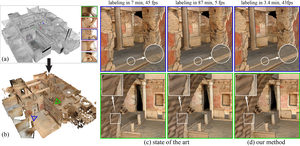Information
- Publication Type: Journal Paper (without talk)
- Workgroup(s)/Project(s):
- Date: February 2016
- DOI: 10.1109/TVCG.2015.2430333
- ISSN: 1077-2626
- Journal: IEEE Transactions on Visualization & Computer Graphics
- Number: 2
- Volume: 22
- Pages: 1127 – 1137
Abstract
With the enormous advances of the acquisition technology over the last years, fast processing and high-quality visualization of large point clouds have gained increasing attention. Commonly, a mesh surface is reconstructed from the point cloud and a high-resolution texture is generated over the mesh from the images taken at the site to represent surface materials. However, this global reconstruction and texturing approach becomes impractical with increasing data sizes. Recently, due to its potential for scalability and extensibility, a method for texturing a set of depth maps in a preprocessing and stitching them at runtime has been proposed to represent large scenes. However, the rendering performance of this method is strongly dependent on the number of depth maps and their resolution. Moreover, for the proposed scene representation, every single depth map has to be textured by the images, which in practice heavily increases processing costs. In this paper, we present a novel method to break these dependencies by introducing an efficient raytracing of multiple depth maps. In a preprocessing phase, we first generate high-resolution textured depth maps by rendering the input points from image cameras and then perform a graph-cut based optimization to assign a small subset of these points to the images. At runtime, we use the resulting point-to-image assignments (1) to identify for each view ray which depth map contains the closest ray-surface intersection and (2) to efficiently compute this intersection point. The resulting algorithm accelerates both the texturing and the rendering of the depth maps by an order of magnitude.Additional Files and Images
Weblinks
BibTeX
@article{arikan-2015-dmrt,
title = "Multi-Depth-Map Raytracing for Efficient Large-Scene
Reconstruction",
author = "Murat Arikan and Reinhold Preiner and Michael Wimmer",
year = "2016",
abstract = "With the enormous advances of the acquisition technology
over the last years, fast processing and high-quality
visualization of large point clouds have gained increasing
attention. Commonly, a mesh surface is reconstructed from
the point cloud and a high-resolution texture is generated
over the mesh from the images taken at the site to represent
surface materials. However, this global reconstruction and
texturing approach becomes impractical with increasing data
sizes. Recently, due to its potential for scalability and
extensibility, a method for texturing a set of depth maps in
a preprocessing and stitching them at runtime has been
proposed to represent large scenes. However, the rendering
performance of this method is strongly dependent on the
number of depth maps and their resolution. Moreover, for the
proposed scene representation, every single depth map has to
be textured by the images, which in practice heavily
increases processing costs. In this paper, we present a
novel method to break these dependencies by introducing an
efficient raytracing of multiple depth maps. In a
preprocessing phase, we first generate high-resolution
textured depth maps by rendering the input points from image
cameras and then perform a graph-cut based optimization to
assign a small subset of these points to the images. At
runtime, we use the resulting point-to-image assignments (1)
to identify for each view ray which depth map contains the
closest ray-surface intersection and (2) to efficiently
compute this intersection point. The resulting algorithm
accelerates both the texturing and the rendering of the
depth maps by an order of magnitude.",
month = feb,
doi = "10.1109/TVCG.2015.2430333",
issn = "1077-2626",
journal = "IEEE Transactions on Visualization & Computer Graphics",
number = "2",
volume = "22",
pages = "1127--1137",
URL = "https://www.cg.tuwien.ac.at/research/publications/2016/arikan-2015-dmrt/",
}


 draft
draft image
image
![video: [45MB]](https://www.cg.tuwien.ac.at/research/publications/2016/arikan-2015-dmrt/arikan-2015-dmrt-video:thumb175.png)
